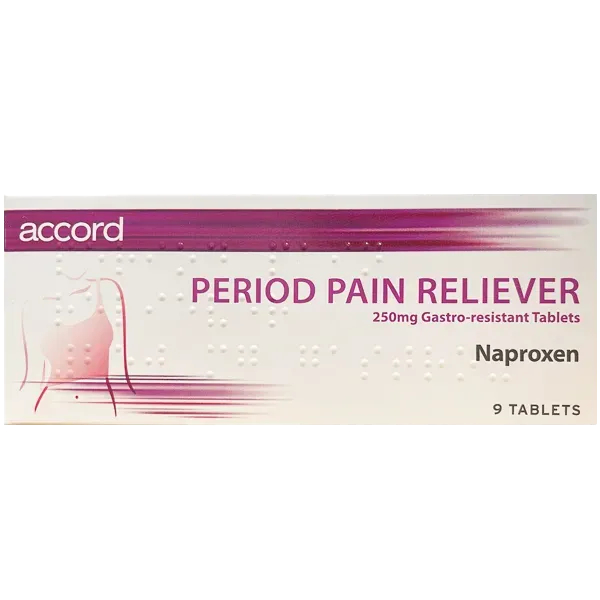*Brands may vary. please contact us for specific brands.
Naproxen 250mg Period Pain Reliever Gastro-resistant – 9 Tablets
£9.79
- Provides effective relief from period pain in women aged 15 to 50
- For oral use
- Non-steroidal anti-inflammatory
Naproxen belongs to a group of medicines called non-steroidal anti-inflammatory drugs (NSAIDs). Period Pain Reliever is used to treat period pains (also called menstrual pain or dysmenorrhoea) in women aged 15 to 50 years old.
In stock

Discreet Packaging

UK Based
-
Naproxen Period Pain Reliever – 250mg Gastro-resistant Tablets
What Period Pain Reliver is and what it is used for
Naproxen belongs to a group of medicines called non-steroidal anti-inflammatory drugs (NSAIDs). Period Pain Reliever is used to treat period pains (also called menstrual pain or dysmenorrhoea) in women aged 15 to 50 years old.What you need to know before you take Period Pain Reliever
Do not take Period Pain Reliever but see a doctor instead if you:- Are allergic to naproxen, medicines containing naproxen sodium or to any of the other ingredients of this medicine.
- Are allergic to aspirin, ibuprofen or other non-steroidal anti-inflammatory medicines (NSAIDs), or if you have developed signs of asthma (wheezing), runny nose, swelling of the skin or rash when taking these medicines.
- Have or have had stomach or duodenal (gut) ulcers, bleeding in the stomach or intestines (gastrointestinal bleeding) r have had two or more episodes of stomach ulcer, perforation or bleeding.
- Have severe heart failure, liver or kidney failure.
- Are in the last three months of pregnancy.
Possible Side Effects
Like all medicines, this medicine can cause side effects, although not everybody will experience them. If any of the side effects get worse, or if you notice any side effects not listed in the patient information leaflet, please tell your doctor or pharmacist. Stop taking Period Pain Reliever and tell your doctor or pharmacist, or go to your nearest hospital casualty department immediately if you experience any of the following serious side effects:- An allergic reaction: swelling of the face, mouth, tongue, airways or body; difficulty breathing or wheezing, coughing up blood; skin reactions including; hives (pale/red raised skin with severe itching), itchy skin rash, blood spots, bruising or discolouring of the skin, raised purple rashes, red skin patches, bumpy rashes, blisters, dermatitis (skin shedding, itching, swelling).
- Severe skin rash with flushing , blisters or ulcers (Stevens-Johnson syndrome); a severe rash with reddening, peeling and swelling of the skin that resembles burns (toxic epidermal necrolysis); blistering of skin when exposed to sunlight (pseudoporphyria).
- Heart attach or stroke.
- Serious stomach problems: ulcer or inflammation in the stomach or gut (causing indigestion, heartburn, pains in your stomach, feeling or being sick); worsening of colitis and Crohn’s disease (pain, diarrhoea, vomiting, weight loss); black tarry looking stools (signs of bleeding and perforation of the stomach and intestines); vomit any blood or dark particles that look like coffee grounds; pancreatitis (causing fever, stomach pain, sickness).
- Sudden shortness of breath, chest pain, nausea, these could be signs of hyperkalaemia.
- Meningitis (symptoms include a stiff neck, headache, feeling or being sick, fever, sensitivity to bright light and confusion).
- Liver problems including yellowing of the skin or whites of your eyes (jaundice); feeling tired, loss of appetite, feeling or being sick, pale coloured stools (hepatitis shown in blood tests).
Other Side Effects
- Stomach or gut problems
- Heartburn, nausea, vomiting, constipation, diarrhoea, flatulence, indigestion; abdominal discomfort or pain.
- Blood disorders
- Changes to the number and types of blood cells causing illness such as anaemia or an increased risk of infections.
- Mental illness
- Difficulty sleeping (insomnia); abnormal dreams; depression; confusion; seeing, hearing or believing things which are not real (hallucinations).
- Nervous system
- Fits or seizures; dizziness; headache; light-headedness; drowsiness; pins and needles or numbness of your hands and feet; difficulty concentrating or forgetfulness.
- Eyes and ears
- Changes to your eyesight; eye pain; changes to your hearing including ringing in your ears (tinnitus) or loss of hearing; spinning sensation (vertigo).
- Heart and circulation
- Swelling of hands, feet or legs (oedema); fluttering in your chest (palpitations); high blood pressure; problems with the way your heart pumps blood around the body or damage to blood vessels (signs include chest pain, tiredness, shortness of breath, feeling faint, general pain).
- Chest
- Difficulty breathing, wheezing or coughing; pneumonia or swelling of your lungs.
- Urinary
- Blood in your urine; kidney problems.
- General
- Thirst; fever; feeling generally tired or unwell; sore mouth or mouth ulcers; muscle pain or weakness; problems for women in getting pregnant; sweating; hair loss.













